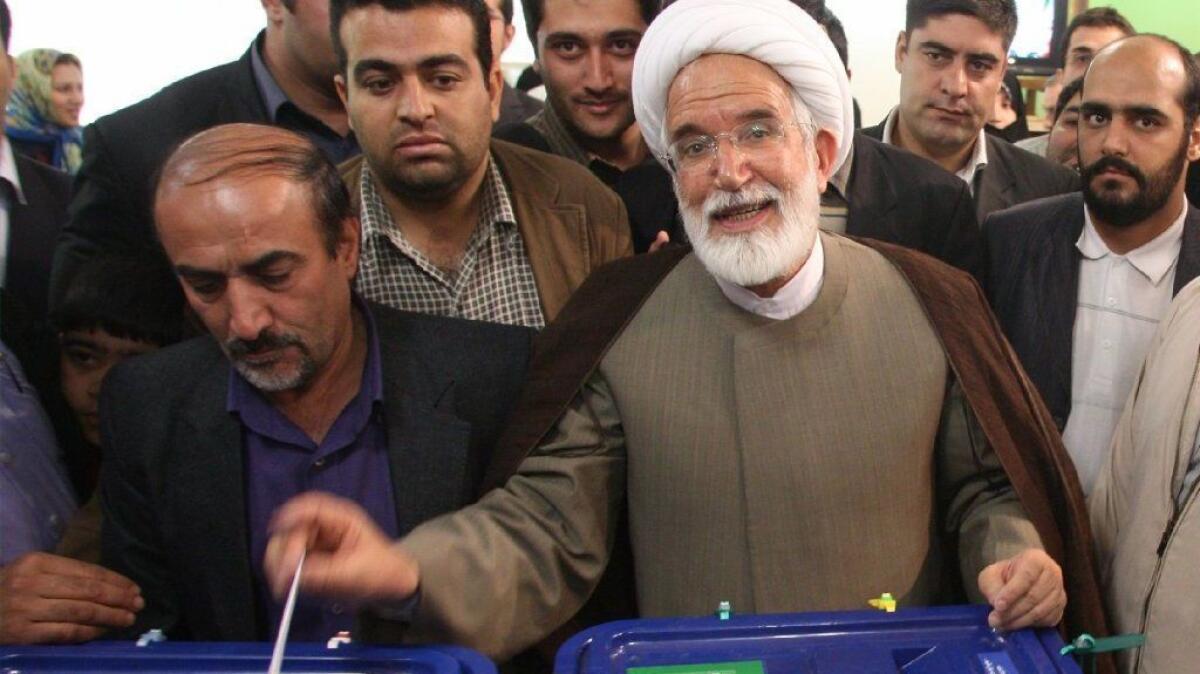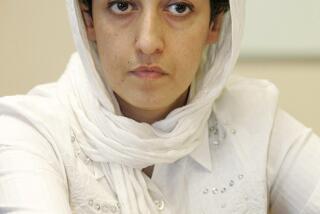79-year-old Iranian opposition leader calls off hunger strike but will remain under house arrest

- Share via
Reporting from Tehran — One of Iran’s leading opposition politicians called off a hunger strike from his hospital bed on Thursday after intelligence officials agreed to withdraw agents from his house, where he has been under arrest for six years.
Mehdi Karroubi, a 79-year-old who suffers from heart disease and was recently outfitted with a pacemaker, was hospitalized Thursday morning with high blood pressure, hours after beginning the hunger strike.
He demanded that authorities remove the 12 intelligence agents posted around the clock at his home and set a date for him to stand trial, said his son, Mohammad Taghi Karroubi. The elder Karroubi, who led a protest movement after the disputed 2009 presidential election, has been held with no charges.
The strike generated such a public outcry that officials from the intelligence and health ministries visited Karroubi on Thursday evening for “negotiations,” according to the Saham news agency, which is close to the Karroubi family.
Karroubi’s son tweeted afterward that officials promised to expend “all their efforts” to give him a public trial. But no date was set, and it seemed likely that the ailing opposition leader would remain under house arrest indefinitely, albeit with a smaller security presence.
Karroubi would remain in the cardiac care unit of Shahid Rajaie Hospital in northern Tehran for 48 hours for observation, his son said.
The hunger strike, though brief, intensified pressure against Iranian President Hassan Rouhani, who has frustrated his supporters by failing to enact many of the reforms he promised, including the release of Karroubi and two other opposition leaders.
During his reelection campaign this year, Rouhani supporters wore green armbands to rallies and demanded the release of Karroubi, former Prime Minister Mir-Hossein Mousavi and his wife, Zahra Rahnavard — leaders of the so-called Green Movement.
Karroubi and Mousavi are reformists who ran unsuccessfully for president in 2009 against incumbent Mahmoud Ahmadinejad in a disputed election that was followed by widespread protests. Two years later, in the wake of the Arab Spring unrest elsewhere in the Arab world, they were placed under house arrest, where they have been held without charges.
Rouhani’s failure to secure the opposition leaders’ release underscores his limited powers despite winning two national elections. Many of the president’s reform-minded supporters have grown disillusioned after he named an all-male Cabinet, believing he is being outmaneuvered by the hard-line clerics and security officials who guide Iran’s theocracy.
This February, three months before the election, the country’s supreme leader, Ayatollah Ali Khamenei, rejected calls for “national reconciliation,” indicating that the Green Movement leaders would remain under arrest.
Ali Motahari, the deputy speaker of Iran’s parliament, wrote on Instagram that Karroubi’s hunger strike “should be a warning to those who insist on the continuation of his house arrest.”
People close to Karroubi’s family had said he was receiving nutrients via intravenous drip while in his hospital bed. But they were worried that complications from hypertension and heart disease could endanger his life.
“If he passes away, Rouhani’s supporters will withdraw their support,” Siavash Ramesh, an outspoken political activist, said before the strike ended. “They will be convinced that Rouhani and his gang are a bunch of liars who bagged votes and did nothing for those under house arrest.”
Special correspondent Mostaghim reported from Tehran, and Times staff writer Bengali from Mumbai, India.
Twitter: @SBengali
ALSO
After Iran bans two soccer players for playing against Israelis, fans rush to their defense
UPDATES:
8:50 a.m.: This article was updated after the hunger strike ended.
This article was originally published at 6:45 a.m.
More to Read
Sign up for Essential California
The most important California stories and recommendations in your inbox every morning.
You may occasionally receive promotional content from the Los Angeles Times.














